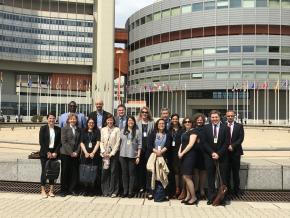ECNL represented the ICNL Alliance at the global Financial Action Task Force FATF Private Sector Consultative Forum in Vienna on April 23-24, where ECNL holds one of the four CSO seats. We delivered a strong message - that civil society organizations (CSOs) need to be part of all phases when FATF standards are implemented, and that the problems of de-risking are flowing down from governments to banks (which then reject low profit customers). As the forum brings together government, banks, lawyers, money transfer companies, IT businesses as well as nonprofits, it allowed ECNL to compare cross-sector issues, which need to be addressed in parallel. Being part of a cross-sector gathering also gave ECNL more leverage to place the CSO asks for FATF action around de-risking. ECNL and the Human Security Collective also presented our new research report on bank de-risking at the Forum.
Outcomes of discussions
In their conclusions of the meeting, the FATF recommended stronger engagement of all stakeholders in all processes. In addition, the FATF recognizes de-risking as a serious cross-sectoral issue and has further recommended addressing it through multi-stakeholder dialogues at national, regional and global levels. The Forum additionally held an interesting discussion on Digital identity, Fin Tech and Reg Tech– the use of cryptocurrency and blockchain and its opportunities and challenges. Privacy of personal data remains a key concern. There is a need to review the potential use of cryptocurrency and blockchain for easing cross-border grant making or alleviating de-risking issues, and how it can be further used to enhance civic freedoms, without hampering them.
Implementation of risk assessment and evaluation processes
On the eve of the Forum, ECNL co-organized a side event with the FATF focusing on implementation of risk assessment and evaluation processes. Jointly with our partners, ECNL coordinated the participation of 12 CSO colleagues from different countries. CSOs stressed importance of continued outreach of governments to our sector in all stages of the FATF process (before, during and after the evaluation). We also received positive feedback on the risk assessment methodology we have been testing in a few countries with our partners, and are now discussing steps to further develop it and pilot it. With the new risk-based approach, national Risk Assessments of the nonprofit sector became key to the implementation of the FATF standards and governments are struggling how to do it. ECNL and our partners are now looking into possibilities to strengthen and deepen the FATF guidance on risk assessments with specific emphasis on challenges of engaging civil society.
